I'm an engineer, physicist, and astronomy professor by profession and I game, philosophize, and study politics and history on the side. Expect an eclectic mix of anything and everything from me.
Last active 60 minutes ago
Don't wanna be here? Send us removal request.
Text
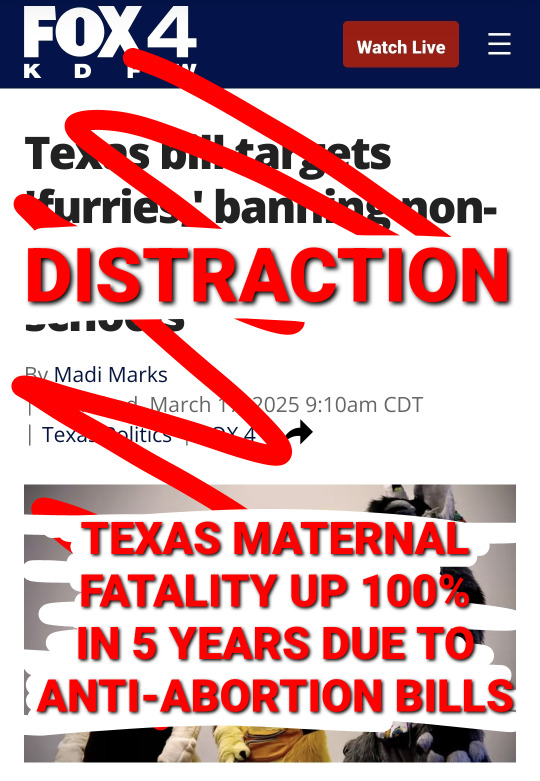
Don't let Republicans distract you with gimmicky culture war bills. Republican policies are making Americans' lives shorter and worse in every conceivable way.
15K notes
·
View notes
Text
Russia invading Ukraine is one of the most morally clear-cut conflicts, period. A former empire, much larger than its neighbour/prior colony, invades it due to longstanding revanchist fantasies of reclaiming its lost imperial glory. The smaller country has to fight back to ensure its survival, especially since its aggressor has repeatedly stated its intent to wipe it out even if it submits. Someone who supports Russian irredentism and imperialist warmongering is either someone profoundly ideologically poisoned, evil, or both.
2K notes
·
View notes
Text
There was a flurry of news about tariffs. It passed. The real consequences will hit US consumers around Memorial Day. Important then to remind everyone of cause and effect.
156 notes
·
View notes
Text
As both an engineer and a college professor, the idea of someone being able to pass their classes with ChatGPT disturbs me on two levels.
First of all, yes, doing it all with ChatGPT makes you unqualified to be an engineer, but, secondly, any engineering program that you CAN pass with ChatGPT is one that isn't turning out qualified engineers in the first place.
"i don't care if they make their whole way though uni with chatgpt" i think you guys are so internetpilled that you have forgotten there are actual jobs out there that require people to know what they are doing in any way possible or else people die
53K notes
·
View notes
Text
My standard response to the NRA types is "oh good, then there's no problem if we ban guns because you can just use a knife for self defense." Haven't found one that won't immediately backtrack yet.
Also, fully agreed on your main point about a lot of liberals/progressives being unfamiliar with the arguments made against them. It reminds me of an article I read a while ago (couldn't find it with a quick search, let me know if you're interested and I'll do a deeper dive) talking about how it's easier to gerrymander Democratic voters because they often tend to live in more homogeneous communities. Seems like that would also make it easier not to be exposed to alternative points of view.
So, I’m going to use what I think is actually a really under discussed, important observation to discuss something pretty trivial.
Keep reading
142 notes
·
View notes
Text
You know, I keep seeing things go around talking about how Millennials are poorer than Baby Boomers and GenX at the same ages and, while that is absolutely true, I think it misses some important context.
First off, do you know how most young people get wealth? I know we don't like to talk about it much because it blows a hole in our idea of the US as a pure meritocracy, but most wealth isn't built up over the course of a single lifetime, it's accumulated through multiple lifetimes and, ultimately, inherited. In other words, for a generation's wealth to expand significantly, the previous generations have to die off.
Here's where life expectancy becomes important. In order to illuminate this, I'll use a very specific example. My parents are Baby Boomers, born at the tail end of the baby boom at the very end of the '50s. Their parents were born in the '30s, between 1930 and 1936. If we check life expectancy, the average person born in America in 1950 had an expected life span of 59.7 years. It was 61.7 years in 1935. Meanwhile, by 1960, it was 69.7.
That means that all of the people who were born when I was with parents the same age as mine and grandparents the same age as mine will wait, on average, ten years longer than their parents did to inherit.
I get the impulse to compare apples to apples and it seems like "wealth at 40" would be a direct comparison, but, depending on how the parental and grandparental life expectancy shakes out, we really should be comparing different ages given how wealth actually works.
0 notes
Text

If a Democrat said anything remotely as positive about an Islamist terror group the Republicans and Fox News would never shut up about it.
They'd demand that person resign or be impeached, they'd act like that person is personally responsible for every 9/11 death and every dead soldier since then. They'd start rumors and speculations about that person receiving money from terror-supporting regimes (like say, heaving real-eastate and crypto dealings with Qatar)
115 notes
·
View notes
Text
Just sitting here thinking to myself, it's only been 75 years since it became normal for parents not to bury their own children. It's only been about 3 generations since we mourned a quarter of our children. It's been a tiny sliver of a slice of the history of humanity since surviving your first 10 years was a coin flip
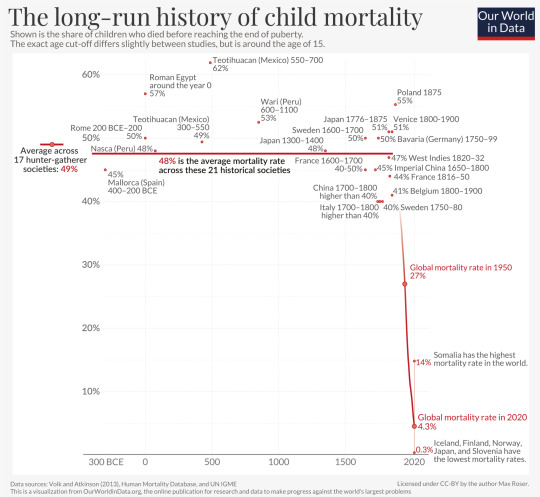
source
and I can't even imagine it. I cannot comprehend what it was like for 99.99% of history. How did they survive burying half of their children? I fully expect my own children to outlive me; it will be considered a rare, unexpected tragedy if they don't. How was this much misery normal for that much of history?
2K notes
·
View notes
Photo
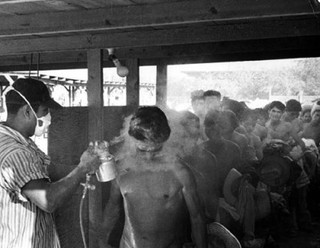
On 28 January 1917, Carmelita Torres, a 17-year-old Mexican maid who worked in the United States, refused to take the mandatory gasoline bath given to day labourers at the border, and convinced 30 other trolley passengers to join her.
Her protest spread in what became known as the bath riots. Torres was one of many workers who crossed the border between Juarez and El Paso each day. In the name of public health, Mexican workers were frequently subjected to degrading and humiliating treatment. They had to strip naked, brave, undergo a toxic gasoline bath, and have their clothes steamed. The stated aim of the programme was to kill lice, which can spread typhus. However, it was not applied to everyone crossing the border: just working class Mexicans.
In addition to gasoline being poisonous, it was also a deadly fire risk. A group of prisoners in El Paso being treated with gasoline were burned to death in an accidental fire. Furthermore, US health workers were secretly photographing naked Mexican women.
On January 28, anger at the practice finally exploded, and within a few hours Torres had amassed a crowd of several thousand mostly women protesters. They blocked all traffic and trolleys into El Paso. They pelted immigration officers with rocks and bottles when they try to disperse them, and when US and then Mexican troops arrived they received the same treatment. The riots were eventually suppressed by the soldiers, and Torres herself was arrested. This appeared to have the effect of discouraging future protests.
The enforced bathing and fumigation of Mexican workers with toxic chemicals like gasoline, and later DDT and Zyklon B, continued until the 1950′s. The use of Zyklon B at the border appealed to scientists in Nazi Germany, who in the late 1930′s began using the agent at borders and in concentration camps for delousing. Although notoriously they later used it to exterminate millions of people in the Holocaust.“
10K notes
·
View notes
Text
You know, it's really notable to me how few of the conspiracy minded people who keep talking about "following the money" actually seem to be capable of doing that. Time for a LONG RANT (TM).
Think about it, where is the money in health care? Sure, the pharmaceutical industry makes $1.6 trillion globally per year, but do you know how much "alternative" medicine makes? The global "wellness" industry, which includes food and nutrition, wellness and spas, and general fitness, many of the industries promoted as alternatives by the people who oppose the products of the pharmaceutical industry, makes $6.8 trillion. Granted, this is a pretty broad category which can include some more standard medical things in it, but if even a quarter of this category is the more conspiratorial "alternate medicine", that would still make it bigger than "Big Pharma".
There's also been a big effort to cast climate scientists as being in it for the money, but how much money is there really? The average salary for an Assistant Professor, the basic position you'll have if you're doing research on climate science, is just under $100k per year. However, if you have a doctorate in that kind of a field, you should know that you can earn significantly more if you just work directly for the industry. In fact, most jobs in the oil and gas industry pay significantly better than similar jobs outside the industry. I would also point out that one job that pays even more than science in general is being an executive for the oil industry. Overall, the market for crude oil is over $2 trillion globally, the market for coal is over $650 billion globally, and the market for natural gas is over $1.25 trillion globally. Meanwhile, climate research funding is hard to track because it's so decentralized, but the most comprehensive study I can find estimated in 2020 that that funding had averaged less than $20 billion per year since 1950. In fact, even if all of that funding in the last 70 years had been concentrated into a single year, it would barely be more than the natural gas industry alone makes in a single year.
The same is true when we look at people, let's take a look at the president beloved by conspiracy theorists, Donald Trump, and his 2020 opponent, Joe Biden. Between 2020 and 2024, Biden's net worth increased from $8 million to $10 million, just slightly more than the sum total of his presidential salary over those 4 years. As for Donald Trump, it's incredibly hard to get a true value of his net worth or income since his business is privately held and Trump infamously releases as little information about his finances as possible, but let's take a look at one thing we do have good information on, the $TRUMP meme-coin. The coin was released in January 17th, 2025, just 3 days before Trump took office for a second term. 80% of the virtual coins were held by Trump himself while 20% were released for sale. In addition, this coin can only be bought or sold through companies owned directly by Trump himself which then collect fees on those sales. So far the sale of the 20% of coins that have been sold so far have brought in at least $350 million between the coins themselves and the fees collected.
However, I should note that this only one way that Trump benefits from this. Because the coins have speculative value based on the current trading price, the 80% of coins that Trump retains represent net wealth for him. In other words, someone can directly put money in his pocket by buying the coin. Not only does that person pay him for the coin, they also pay him a fee in the process and the purchase itself raises the price of other coins. The day after it launched, the 80% of coins that Trump owns had a speculative value of approximately $20 billion. And that's only one of Trump's dozens or even hundreds of business ventures that open paths for people to give him money.
So why are conspiracy people constantly thinking that the side with less money is swimming in it? Simple, because they are being told that by the people with money and they haven't actually done the work themselves to see where the money actually goes. This isn't conspiracy thinking here, opponents of mainstream medicine such as RFK Jr., the fossil fuel industry, and Donald Trump himself have all directly accused their opponents of profiting from their work while neglecting to mention any income on their own side of the issue. In fact, the fossil fuel industry in particular was recently exposed as having run a multi-decade campaign to encourage conspiracy thinking on climate issues similar to the tobacco industry's earlier campaign against public health information about their own product.
In this light, I especially need to emphasize yet again that conspiracy theories aren't about facts, they're about an emotional narrative of heroically resisting against impossible odds. The people shouting "follow the money" haven't done so themselves and, if you show them the data, they'll either deny it, ignore it, or find another reason to believe what they want/need to believe until you address the root emotional reasons for their conspiracy theorizing.
So what's the value of going through this if conspiracy theorists won't believe it anyways? Because there's a lot of people out there who believe this who aren't conspiracy theorists. I get it, walking a conspiracy theorist back to the real world is really hard and may not always be possible, but we're at the point now where conspiracy ideas are discussed and aired in the mainstream and there are lots of people who are exposed to them and may even believe them who are willing to listen to actual evidence. We owe it to them not to just write them off, but to present evidence to anyone who parrots this particular argument and see if they're amenable to listening.
Meanwhile, your job in any kind of debate like this is simple, throw their line back at them; tell them to follow the money. In the best case scenario, they'll do it, either with you or later, and figure out the reality of the situation. At worst, you'll at least shut them up for a minute or two, and won't that silence be nice?
#politics#us politics#economics#conspiracy theories#conspiracy thinking#follow the money#trump#long rant (tm)
40 notes
·
View notes
Text
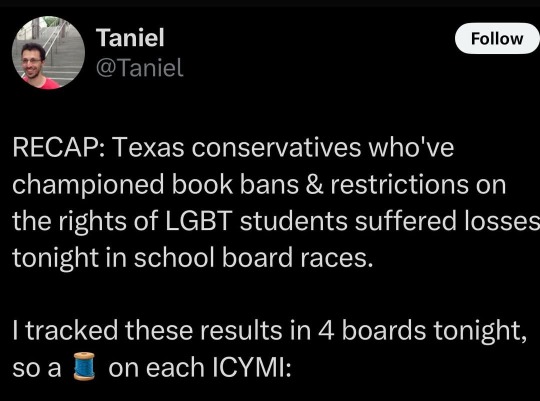
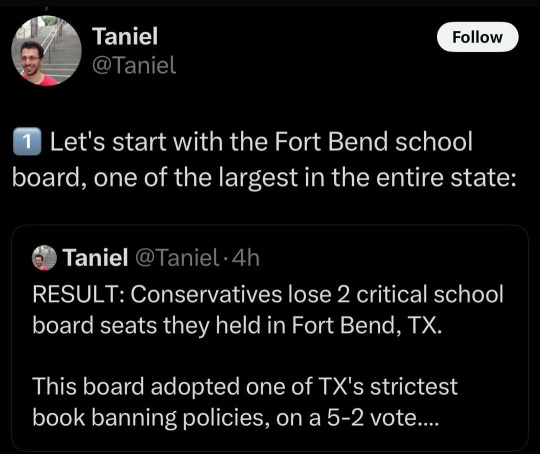
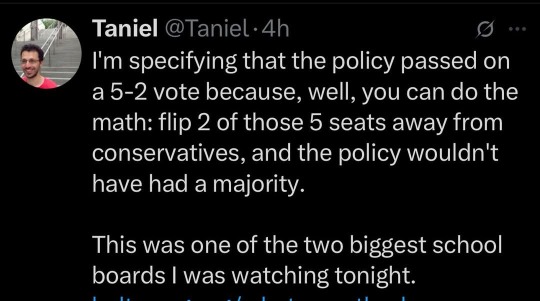
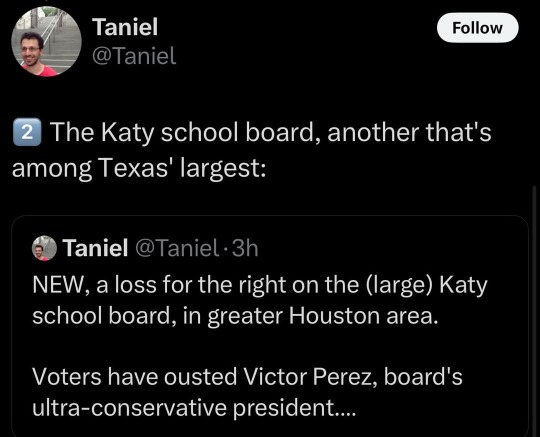
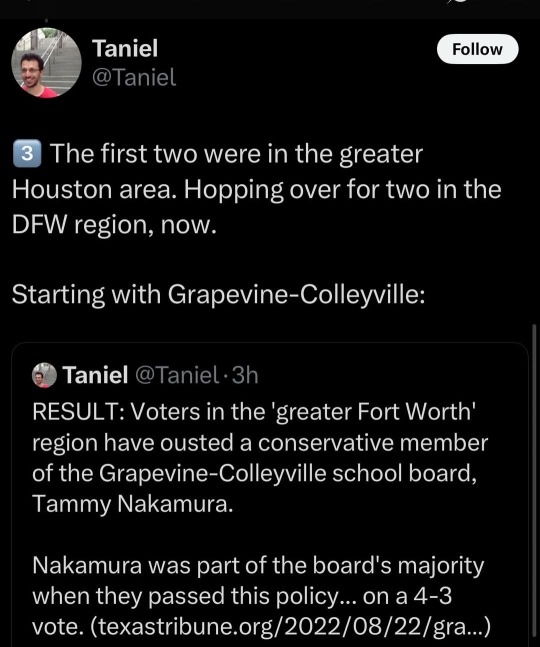
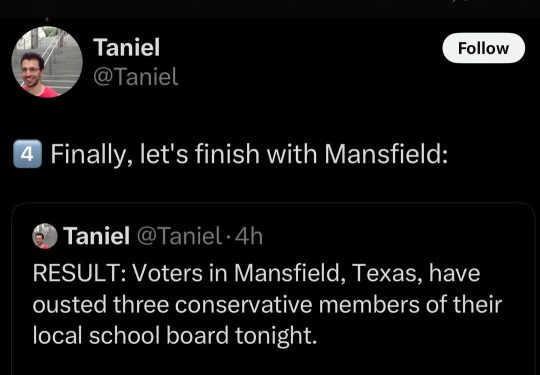

Every goddamn vote on every goddamn issue matters and can have ripple effects. Anyone who says not to vote because of whining about political purity or anything like that can eat my entire ass.
2K notes
·
View notes
Text
Honestly, the only thing innate seems to be sucking on a nipple. It was fairly bizarre seeing my totally uncoordinated newborn kid suddenly and with purpose purse their lips and rapidly move their head on a perfectly straight line as soon as my wife's naked breasts came close.
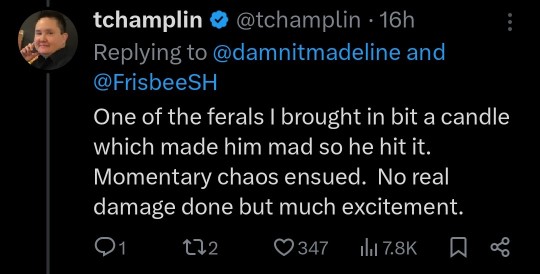
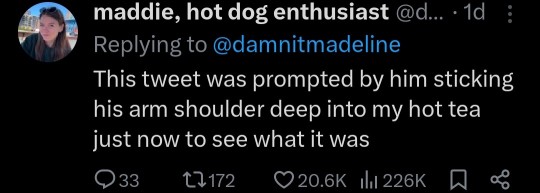

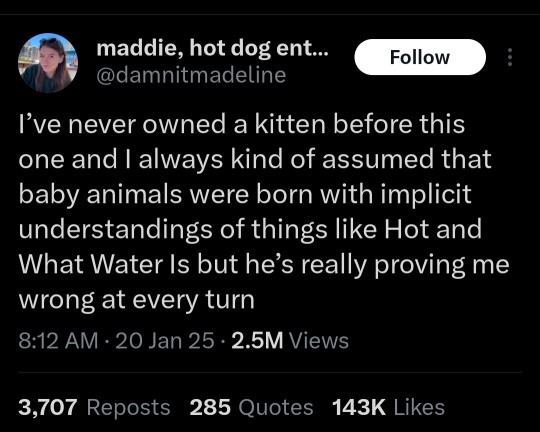

55K notes
·
View notes





